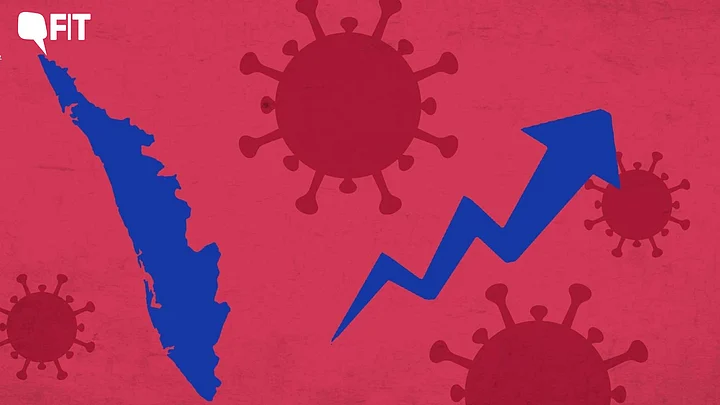As of Monday, 25 December, 69 cases of the new COVID-19 subvariant detected in Kerala earlier this month, JN.1 have been confirmed in India, according to official sources, reported ANI.
34 of these cases were reported in Karnataka alone, according to the state health department. "Majority of the cases are in Bengaluru. People are advised to maintain physical distance," said Karnataka Health Minister, Dinesh Gundurao on Tuesday.
Coinciding with the holiday season, the current surge in COVID cases in the the country has sparked concerns.
JN.1 was first detected in Kerala on 8 December in a 79- year-old woman, from Karakulam in Thiruvananthapuram district. She has now recovered, according to authorities.
The Union Ministry of Health and Family Welfare released an advisory on Monday, 18 December, asking states to make arrangements and put public health measures in place to minimise transmission of the infection.
Health authorities have said they are monitoring the situation and have asked people, especially those with comorbidities, to remain cautious.
Is JN.1 more infectious than other subvariants? Has it been detected in other states? How can you protect yourself?
FIT answers your FAQs.
Is JN.1 a new COVID-19 variant?
No, JN.1 is a subvariant of the BA.2.86 Omicron subvariant.
Omicron the COVID-19 variant that was first detected in November 2021, has been the dominant variant in India since.
When was the new variant detected in Kerala?
JN.1 was first detected in Kerala on 8 December in a 79- year-old woman, from Karakulam in Thiruvananthapuram district, with mild flu-like symptoms tested positive for COVID-19 on an RT-PCR test.
The subvariant was identified when the sample was put through an ongoing routine surveillance activity of the Indian SARS-CoV-2 Genomics Consortium (INSACOG), and has been linked to the slight upurge in cases in the state.
What is the status of the patient?
The patient only had mild symptoms, and has since recovered, said the state health authorities.
What do you know about the subvariant?
All Omicron subvariants, especially BA.2, have been highly infectious so far. And according to experts, the JN.1 subvariant contains a mutation in the spike protein that could make it more infectious than previous Omicron variants.
The cases detected so far have been clinically mild, and no new symptoms have been detected linked to this subvariant either.
What else are the health authorities saying?
"As the COVID-19 virus continues to circulate and its epidemiology behaviours gets settled with Indian whether conditions, and circulation of other usual pathogens it is of utmost importance that we maintain a state of constant vigil over the COVID situation, right up to the district level."The Ministry of Health and Family Welfare advisory
The MoHFW advisory also says, "At this time, there is no evidence that JN.1 presents an increased risk of public health relative to other circulating variants."
Speaking to the media earlier, Kerala State Health Minister, Veena George said: "There is no need for any concern. It's a sub-variant. It's just that Kerala has identified the variant here through genome sequencing...The situation is being closely monitored."
"But we should be alert. People with comorbidities should be taken care of."Veena George, Kerala Health Minister
Is JN.1 present in other parts of the country?
So far, the variant has been detected in Goa, Maharashtra, Karnataka, Tamil Nadu and Telangana.
According to health authorities in India and in Singapore, an Indian passenger screened in Singapore Airport last month was found to have JN.1. This led to the speculation that the subvariant may have already been in circulation in India well before it was clinically detected.
Karnataka Health Minister Dinesh Gundu Rao has said that health officials have been instructed to conduct mock drills, hospitals have been asked to allocate ICU beds, and check the availability of oxygen and medicines. However, he also added that they have ruled out the need to restrict movement on the border at present.
Is it linked to the current surge in COVID cases in Singapore and other countries?
Most likely.
According to the MoHFW's advisory, other than India, JN.1 has been detected in China, US, and Singapore so far.
Since the beginning of December, Singapore has seen a surge in COVID cases. In a recent press briefing, the Singapore Health Ministry said that COVID cases in the country had spiked from 32,035 to 56,043, between 3 to 9 December alone.
The Singapore government has also said that the dominant variant behind this surge is the JN.1 Omicron subvariant.
Despite a lack of evidence to suggest that the current surge could lead to a spike in severe illness, health authorities in the country have released a fresh travel advisory, and asked medical facilities to prepare themselves as a precautionary measure to contain the spread of the virus.
The Health Ministry in Sinagpore has advised travellers to consult a doctor 4 - 6 weeks before their trip to get a health risk assessment done, including advice on vaccinations required.
How can I protect myself this holiday season?
With holiday season just around the corner, it can be hard to practice social distancing and self-isolation. However, precautionary measures to prevent COVID infections remain the same for JN.1 as with any other variant.
Mask up, when you're in public – especially if you or people around you have flu-like symptoms.
Maintain hand hygiene – Wash your hands frequently with soap.
If you have persisting symptoms of flu, self-isolate, and try to avoid going out in crowded spaces.
Keep indoor spaces well ventilated.
Get vaccinated, or boosted, especially if you fall in the vulnerable catagory.

